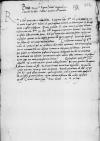Accepimus litteras Paternitatis Vestrae, quibus eorum, quae de morte Sigismund I Jagiellon (Zygmunt I) (*1467 – †1548), King of Poland and Grand Duke of Lithuania (1506-1548); Duke of Głogów (Glogau) (1499-1506), Duke of Opava (1501-1506), Governor of Silesia (1504-1506); son of King Kazimierz IV Jagiellon and Elisabeth of Austria⌊regiae maiestatis PoloniaeSigismund I Jagiellon (Zygmunt I) (*1467 – †1548), King of Poland and Grand Duke of Lithuania (1506-1548); Duke of Głogów (Glogau) (1499-1506), Duke of Opava (1501-1506), Governor of Silesia (1504-1506); son of King Kazimierz IV Jagiellon and Elisabeth of Austria⌋ ad eam scripsimus, meminit, et dolorem suum ex hac ipsa morte acceptum testificatur. Facile credimus Paternitatem Vestram vere et ex animo dolere, habuit enim Vestra Paternitas ex Sigismund I Jagiellon (Zygmunt I) (*1467 – †1548), King of Poland and Grand Duke of Lithuania (1506-1548); Duke of Głogów (Glogau) (1499-1506), Duke of Opava (1501-1506), Governor of Silesia (1504-1506); son of King Kazimierz IV Jagiellon and Elisabeth of Austria⌊illius maiestateSigismund I Jagiellon (Zygmunt I) (*1467 – †1548), King of Poland and Grand Duke of Lithuania (1506-1548); Duke of Głogów (Glogau) (1499-1506), Duke of Opava (1501-1506), Governor of Silesia (1504-1506); son of King Kazimierz IV Jagiellon and Elisabeth of Austria⌋ benignum et clemente ms. u(!)
⌈ee ms. u(!)
⌉m dominum. Nos etiam in assiduo luctu et maerore sumus. Sed quae tamen Dei voluntate fiunt, in his nos acquiescere oportet et de omnibus gratias illi agere aequum est. Sicut Domino placuit, ita factum est. Sit nomen Domini benedictum.
Credebamus venturam esse Paternitatem Vestram ad sepulturam Sigismund I Jagiellon (Zygmunt I) (*1467 – †1548), King of Poland and Grand Duke of Lithuania (1506-1548); Duke of Głogów (Glogau) (1499-1506), Duke of Opava (1501-1506), Governor of Silesia (1504-1506); son of King Kazimierz IV Jagiellon and Elisabeth of Austria⌊domini suiSigismund I Jagiellon (Zygmunt I) (*1467 – †1548), King of Poland and Grand Duke of Lithuania (1506-1548); Duke of Głogów (Glogau) (1499-1506), Duke of Opava (1501-1506), Governor of Silesia (1504-1506); son of King Kazimierz IV Jagiellon and Elisabeth of Austria⌋, et libenter illam videre optabamus, tum ut nos reviseret, tum ut extremum d written over p⌈pdd written over p⌉omino suo defuncto honorem ac obsequium exhiberet. Sed cum per aetatem ac valetudinem praestare id nequeat, indulgemus hoc illi, ut commoditati ac valetudini suae inserviat. Verum tamen nostri non sit istic immemor et pristinam suam erga nos animi propensionem retineat.
Epitaphium, quod Paternitas Vestra defuncto Sigismund I Jagiellon (Zygmunt I) (*1467 – †1548), King of Poland and Grand Duke of Lithuania (1506-1548); Duke of Głogów (Glogau) (1499-1506), Duke of Opava (1501-1506), Governor of Silesia (1504-1506); son of King Kazimierz IV Jagiellon and Elisabeth of Austria⌊regiSigismund I Jagiellon (Zygmunt I) (*1467 – †1548), King of Poland and Grand Duke of Lithuania (1506-1548); Duke of Głogów (Glogau) (1499-1506), Duke of Opava (1501-1506), Governor of Silesia (1504-1506); son of King Kazimierz IV Jagiellon and Elisabeth of Austria⌋ ac domino suo fecit, placuit nobis plurimum. Pro quo gratias illi agimus.
Audimus venisse ad
ill(ustrem) or ill(ustrissimum)⌈ill(ustrem)ill(ustrem) or ill(ustrissimum)⌉ dominum Albrecht I von Hohenzollern-Ansbach (Albrecht von Brandenburg) (*1490 – †1568), 1511-1525 Grand Master of the Teutonic Order; from 1525 to his death Duke in Prussia as a liegeman of the Polish king; son of Friedrich V of Brandenburg der Ältere and Sophia Jagiellon (daughter of Casimir IV Jagiellon), nephew of Sigismund I, King of Poland; founder of the university in Königsberg (1544)⌊ducem PrussiaeAlbrecht I von Hohenzollern-Ansbach (Albrecht von Brandenburg) (*1490 – †1568), 1511-1525 Grand Master of the Teutonic Order; from 1525 to his death Duke in Prussia as a liegeman of the Polish king; son of Friedrich V of Brandenburg der Ältere and Sophia Jagiellon (daughter of Casimir IV Jagiellon), nephew of Sigismund I, King of Poland; founder of the university in Königsberg (1544)⌋ duces duos Germaniae, qui qua de causa venerint, latere Paternitatem Vestram non poterit. Proinde postulamus ab illa, ut qui sint hi, quid acturi venerint, quid confecerint, cito et exacte nobis significet, rem nobis gratam factura.
Quam salvam et felicem diu valere optamus.


 BCz, 3465, p. 356
BCz, 3465, p. 356